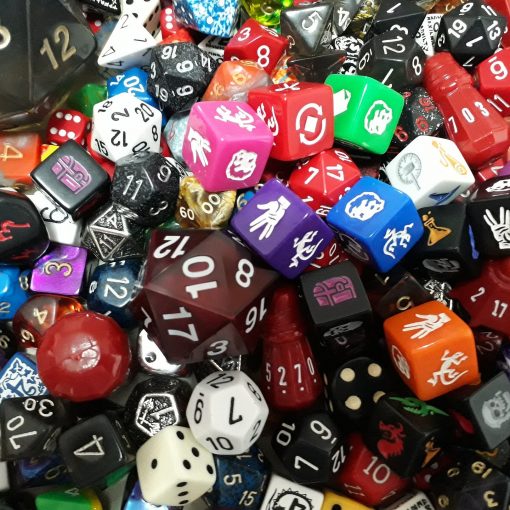Grant and I have been in the same physical location a few times, and we’ve been in the same RPG session many more times, but never both at once. All of the tabletop RPG sessions that included both of us have occurred when we were both at home, and I know from recent experience that our homes are roughly 12.5 hours of steady driving apart. This means that our gaming group has lived out its entire existence in VOIP (Voice Over Internet Protocol) land. Considering we’ve had multiple campaigns and have been together for almost all of Saving the Game‘s three-ish year history, I’d be so bold as to call our group successful.
I also know that, as a guy who is starting to see glimpses of 40 on the horizon, that the likelihood of me going out and gaming with strangers when I can do a little work and game with close friends instead is pretty low. I figured for this week’s blog post, I’d share a few thoughts and lessons collected from 3 years of regular VOIP gaming, because while nothing beats getting together with your group in meat space, sometimes that’s just not practical, or even possible.
- If you’re going to go to the trouble of coordinating an online game with people, make sure it’s a group you really want to game with. One of the advantages our gaming group enjoys is that we can actually game with people spread out over 1200+ miles of territory (and if we ever get our player in Colorado back, it’ll be even more than that). Put together your dream team – the really close friends who you gel with well socially and really enjoy interacting with.
- Set yourselves up some kind of permanent hub. We use a secret Facebook group, but there are all kinds of tools for making a private community online. Pick one that works for your group and use it – being able to work around last-minute scheduling issues and having a central repository for character sheets and reference documents is really useful.
- Have at least three ways to get in touch with everybody in the group. You should have the VOIP service itself, email addresses, and some type of real-time communication. Texting works well for this, but so does social media like Facebook or Twitter if the person checks it regularly. Nothing makes you suddenly worry if your friend is okay like them being 10 minutes late for a VOIP game.
- Be ready for some fluidity in starting times. Adult lives – they interfere, especially if the adults in question are students, parents, or in some way on-call professionally.
- Find a single VOIP client that works and stick with it. We’ve personally found that Google Hangouts work the best – Grant and I use them while recording Saving the Game episodes, too. Some folks are more comfortable with another option like Skype, though, and that can also work fine. The biggest trick is getting one that doesn’t crash anyone’s system. Once you’ve got that handled, you are, as they say, golden.
- Video can be nice, but it’s really not all that important. Being able to hear each other clearly is much more critical. If you’ve got to turn video off in the name of audio quality, do it and don’t look back. This is especially important if somebody is on a weak-to-moderate wifi signal. Along those same lines, if you can use a computer with a physical, wired connection to the router, do it. Finally, do what you need to to make sure everyone can hear everyone else. If you can hear someone fine but they can’t hear you, take the time to remedy the problem instead of trying to work around it.
- Figure out how you’re going to roll dice. We’ve rolled physical dice on the honor system and we’ve used online dice rollers. Both work fine, but give some thought to how you’ll handle this.
- Plan on shorter sessions. Two to four hours is probably all you’ll realistically get. Wearing even a comfortable headset can get a little chafing after a while.
- Stick with lighter systems. It’s easier to run them when you aren’t physically present to pass books around than crunchier systems. Savage Worlds works a lot better over VOIP than GURPS.
- Immersion can be both easier and more difficult. On the one hand, you’re in front of a box of distractions. On the other hand, if you can leave just the VOIP window or something relevant to the game up on screen, the screen itself can pull your eyes away from distractions. A headset helps too.
And that’s all I’ve got. As usual, I’d love to hear from anyone else who has experience with VOIP gaming. Do you agree or disagree with me? Did I miss something important? I’d love to hear in the comments.



